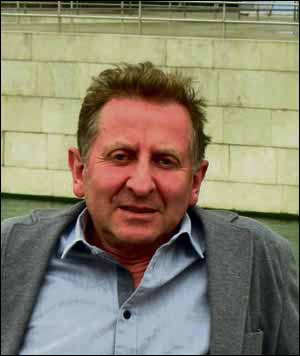|
PROFILE Clive believes film is an art form - not a money maker | |
Southport-born Clive, who has been making films and lecturing on the subject at Welsh universities all his working life, views film as an art form and not as a money spinner. Clive recently premiered his controversial film, The Portrait - which depicts the trauma of the child of a Nazi - at Southport Town Hall in memory of his father Mick Myer, alias Mr AJEX. "Since the birth of cinema in 1895, when people first turned the camera on, there has been a split between the ways in which cinema has gone," he said. "One view was that it was a powerful medium which was taking over from painting and photography. "In the other direction, commerce came in. Hollywood bought out European filmmakers to make loads of money and bad films. "Hollywood commercial cinema is very linear. It has one message that everything will be alright at the end. Hollywood puts films out to an audience to test and if they don't like it, they change it. It is a commercial commodity." To Clive, lovers of the art of film should be prepared to donate their services for next to nothing. That is how his family-run film company, Eclectic Films of Monmouth, works. Clive met filmmaking wife Lynda Bennett while he was lecturing on film at London's Goldsmith College in 1980. They have been working together on film for more than 30 years. They have a daughter, Dorothea, who is an actor at the Shakespeare Tobacco Factory in Bristol, and a son, George, who works with Vertigo Films. Eclectic Films recently screened The Orchard, an improvised version of Checkhov's Cherry Orchard and Pirandello's Six Characters in Search of an Author at the Cambridge Film Festival. The cast was made up of Dorothea's fellow members of the Shakespeare Tobacco Factory, who performed for free. Clive said: "They didn't want any money. They did it for pleasure. They come round with us and talk about the film. "If you have something that is worth doing and that you believe in, into which you put all your passion, other people want to come along to something worthwhile rather than something superficial." He maintained: "If you can stick with what you believe in, you'll carry on making really interesting films. We don't make films to make money. "We firmly believe you don't need 40 people to put on a film. Lynda and I do the camera and the sound and George and Lucy, Lynda's daughter, do the marketing." Clive's passion for his films is so infectious that he persuaded TV actress Juliet Stevenson to star in The Portrait for "next to nothing because she believed in the project". Oblivious of the fact that the Southport Jewish community also gave birth to British film industry pioneer Bertie Samuelson, Clive was inspired towards his love of cinema by lecturers at Southport Art College, where his father also attended. Clive considers his work avant-garde and likens it to that of Pablo Picasso, Andy Warhol, Tracey Emin and Damien Hirst in other genres. He said: "Even the impressionists like Picasso were avant-garde in their day. People used to spit on their paintings, because they thought they were outrageous. "They asked how they dare blur the boundary between reality and imagination. I'd like to associate myself with the people who pushed the frontiers forward. "We are not that alone. There is a whole body of work that we can associate ourselves with. If you want to proudly stand up and say, 'We are doing this because it is important, not because it makes us money'. "Eventually, if there are enough people who appreciate film as an art, artists will survive on their film work." He points to Goldsmiths students Emin and Hirst, who "stood by what they were doing and people were interested in them. Now their paintings are worth millions". He said: "You don't compromise. People will get something out of art in 100 years. Really it's about form, content and context. We are very much interested in different levels, more than one superficial level. "Serious art form is a longer-lasting pleasure, not a quick fix. You get more out at the end if the audience works at it. "It's very much inclusive filmmaking. The audience is as important as the film and the actors. The audience participate in the way that they think through what the film is about. Hollywood cinema takes the audience for granted, sees it as 'Give me your money'. "Film really penetrates. It's not just a superficial love story a la Hollywood with a beginning, middle and end. Every image, every sound and every word means something" Clive really enjoyed his university lecturing career. He said: "Teaching was really important to me because it was where I could pass on this enthusiasm. I have helped out a lot of young students in the last 30 years to begin their filmmaking career. Now he is determined to expand his own family filmmaking career." In the pipeline is a feature-length documentary about Maurice el Medioni, a Jewish piano player who escaped from Algeria in the 1960s and who invented Piano Oriental music. Clive said: "He was part of the Jewish community in Algeria. He had to leave when the nationalists took over in 1962. He went to Marseille and then to Israel. "I am now putting together a film on his life. He was a Jewish Arab. He mixed with Arabs and Christians. "That is the cross-faith way that music works. It brings people together rather than tearing them apart. The opening salvo of the film is, 'Jews and Arabs, the music is all the same'."
|
